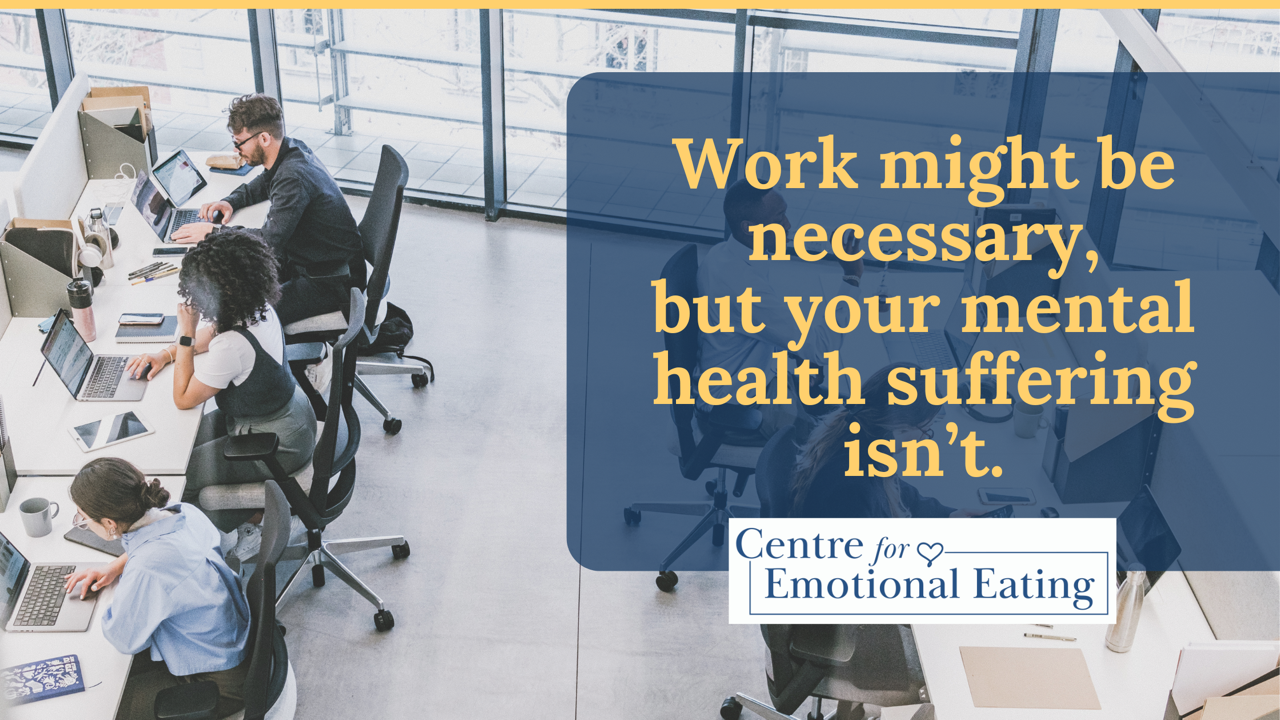BLOG
Find support not just for emotional eating, but all aspects of your well-being.
Supporting Your Mental Health at Work

No matter what you do for work, chances are it is a stressor in your life. Even if you enjoy your job, there might be tasks or colleagues you’d rather not deal with. Work is a necessity not just for income, but also purpose, goal setting, community, and future planning.
That doesn’t mean it isn’t stressful.
Below are a number of ways you can support your mental health as a worker.
Basic Maintenance Goes a Long Way
You might already know that routines, rituals, and structure can support your well-being, so focusing on identifying working hours (and rest or play hours), practicing good sleep hygiene, and implementing boundaries around your work phone or logging in can be incredibly helpful for supporting your mental health. It can also be helpful to create a transition ritual where you let your nervous system know that you are changing from work you to home you. Listen to a meditation app on your commute or change clothes as soon as you are home. These can signal to your body that it...
Retrain Your Brain: Finding Happiness Outside of Food

There are many reasons people emotionally eat: to distract themselves, to feel numb, to have something to control. But one of the common reasons I hear from clients is that food brings them a sense of happiness that they feel doesn’t compare to any other experience currently in their life. This makes emotional eating incredibly difficult to stop relying on when you don’t have others ways of accessing this feel-good emotion. Does any of this sound familiar?
- A snack feels like an only acceptable break from grinding away at work or your to do list. Your brain makes the connection that not working = food.
- You only feel your body relax once the kids are in bed and you can eat alone in the evening. The connection your brain makes here is alone time = food time.
- You only allow yourself to have foods like cake or popcorn at events like parties or at the movie theatre. Here your brain connects special events (happy times) and specific foods.Our brains love to work on auto-pilot because it ...
Three Ways to Manage Your Emotions

Emotional eating bubbles up when you don’t want to feel or experience something. Food is always available and seems like an easier route than facing things head on. But the truth is, your feelings just want to be heard and comforted by you. That is the key to breaking out of the emotional eating cycle, not more will power.
This sense of confrontation can feel very scary when you’ve spent years avoiding your feelings, so we’re sharing 3 great ways to get your emotions out in a way that will help you recognize them and move through them—instead of being stuck in the trigger-eat-regret cycle:
Use your voice. One of the best ways to help diffuse the intensity of your emotions is to talk to yourself out loud. This might feel silly at first, but it can be a great way to identify what exactly you are feeling. Find a space alone (the bathroom is a great one!) and start to find your words, for example: “I am feeling really attacked right now”, “I’m so worried I disappointed them and they are ...
Finding Some Comfort While Grieving

We’re told that grief has stages that we move through, that there is an end to the process. But the truth is much more complex than that. While its intensity can lessen over time, there are often triggers, sometimes unexpected ones, that bring up feelings in new and painful ways.
And while grief is a common experience, it is still a topic many feel uncomfortable talking about. For example, if you’ve lost someone you love, others in your community might not know how to talk to you about it even if you want to keep the conversation—and memory—of your person present. Others often worry they are making you feel worse you by asking how you’re coping.
If you are struggling with grief right now, we want you to know there is no right or wrong way to move through it. To start, reach out to someone you trust or get support from a therapist to help guide you. You might be surprised how freeing it feels to have a safe space to cry or rage. This can create a release of emotions that you don’t hav...
How to Trust Feeling Good After Life Throws You a Curveball

Being on the other side of a challenging life changing event can feel destabilizing. After a period of new levels of anxiety or depression symptoms, you don’t trust feeling good. The truth is that you’re no longer used to feeling positive.
You might feel foolish for not immediately embracing the good, but this lack of trust is much more common than you think! Below we’ve outlined the three stages you can expect when you’ve done the work to move through big emotions and negative experiences.
Step One: You Can’t Believe It
At some point in your recovery, you will notice a subtle shift. It might be in a therapy session when you realize you’re talking about your experiences differently or it might be a moment during your day where you think or react differently than you would in the past. This might be accompanied by a rush of gratitude: you’ve made a change and are “on the other side.”
This will likely be immediately followed by mentally shutting down recognizing (or celebrating!) thi...
What is Holiday Perfectionism? (And How to Let Go if It!)

Holiday movies and social media show us that the holiday season needs to be a certain level of perfect: everyone must be happy, your house must be spotless but also have decorations everywhere, and key memories have to be made. This is what is considered holiday perfectionism, when everything must be done to a certain level or else you feel stressed out, disappointed in yourself, or like a failure.
Women are especially susceptible to falling into the trap of holiday perfectionism because they constantly get messages from childhood to be everything to everyone. They are the ones to make the gift lists, do the shopping, the baking, coordinate the social calendars of spouses and kids. Plus, there is a gender stereotype that women need to be pleasant in the face of any scenario. It is exhausting!
Give yourself a break this year with these 4 tips to feel less stressed about achieving perfection this season:
- Take stock of what you can let go of. Consider what you think is expected of yo ...
4 Reminders for When Your Bathroom Scale Gets the Best of You

It can be so easy to get obsessed with the numbers on your bathroom scale and hop on/hop off every day or sometimes multiple times a day. You might be telling yourself that it’s “just to check in” but let’s look at your motivation a bit more closely:
If the number on the scale is higher than yesterday, do you have a bad day? End up picking yourself apart and vow to restrict what you eat?
Are you stepping on the scale more than once a day? Do you have set ‘rules’ for when you weigh yourself (for example, must be after using the washroom, must be without clothing, etc.)?
If you find yourself letting the number on the scale dictate your mood and actions, here are four reminders you need to hear. Feel free to print these out to read them when you need to, or even tape them on your bathroom mirror!
- It is normal for your weight to fluctuate during the day depending on what you’ve had to eat, drink, or if you’ve had a bowel movement. And if you’re a woman, you can expect your weight to ...
Back to Routine. Back to Burnout?

Now that you’ve settle a little into the fall routine—kids are back in school, summer getaways have ended—you may find yourself refreshed and feeling ready to tackle whatever it is that’s coming up at work. That is a sign of a summer well spent!
Feeling so good might have you taking on more projects at work or overscheduling your time. In order to try and keep a balance (at least most of the time), it is important to notice any signs of burnout early on. While that term can feel scary and so serious that you think “nah, I’d notice if anything was off”, burnout can creep in in ways that you might think are normal. Unfortunately, many workplaces have made these symptoms acceptable and even encourage competition around the water cooler.
Here are five signs to watch out for:
- Poor performance. Usually, you find you can start and finish projects to your own set of standards, but lately you feel like you can’t keep up or give the level you want at work.
- Reduced creativity. This is a sne ...
5 Tips If You Dread Going to the Doctor

Going in to see your doctor might be something that fills you with dread. While you may be all-too familiar with this feeling, there is a name for what you might be experiencing when you step into a clinic: weight bias.
This is defined as negative views, usually based on serotypes or misconceptions, towards people who are overweight or obese.
Everyday people who are overweight face discrimination, from the size of seats on a plane to critical looks and comments from others. There are prominent beliefs that plus size or obese individuals are somehow lesser than, aren’t considered beautiful, and should be blamed (and shamed) for the size of their waistline. This bias also exists in healthcare.
While there have been strides made in providing training to nurses and doctors that provide primary care, it can still be daunting to go to the doctor for something that *seems* simple like an annual checkup. Here are five things to keep in mind that might help you feel empowered when gathering...
What Emotional Eating Gives You

“Why do I eat emotionally? What do I get out of it?”
Sound familiar? We know emotional eating gives us feelings of shame and guilt, it can lead to weight gain, it can begin a spiral of negative self-talk, none of this we would volunteer to experience. But emotional eating gives us other things too; it is powerful. When you let your emotions guide what you eat, it isn’t about what you eat but why.
Eating emotionally…
… works as a distraction: you’re focussed on the food and not how you feel. In some scenarios, you eat so much you can only focus on the physical discomfort of overeating and not on the emotional discomfort.
… gives us pleasure: we reach for foods—like mashed potatoes, doughnuts, and pizza—that overload our senses (our mouth waters, our nose loves the smell). Sometimes the foods we reach for can even remind us of happy memories: meals at grandma’s house, birthday parties with friends, or even incredible meals had on vacation.
… gives us a sense of control. When everyth...


